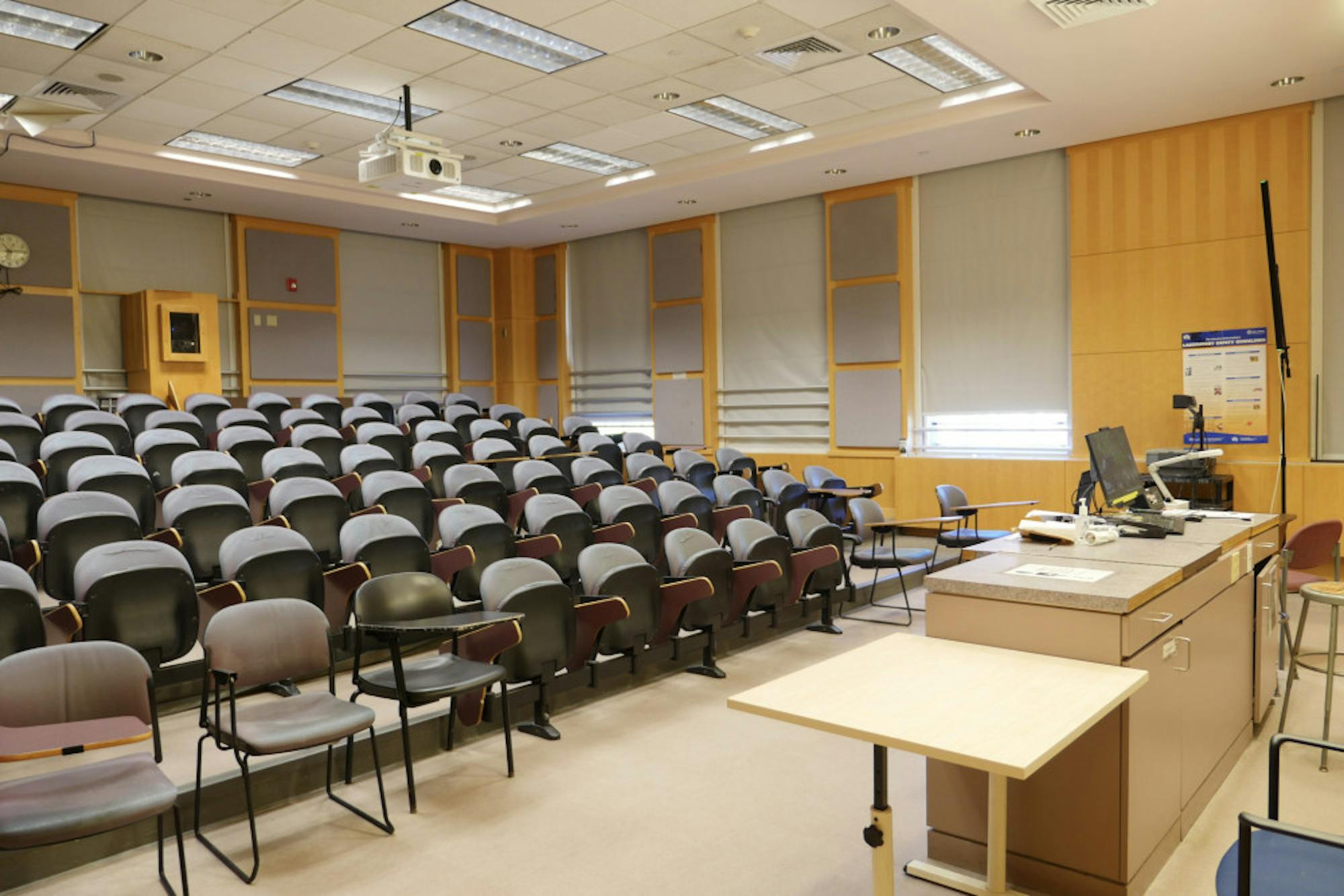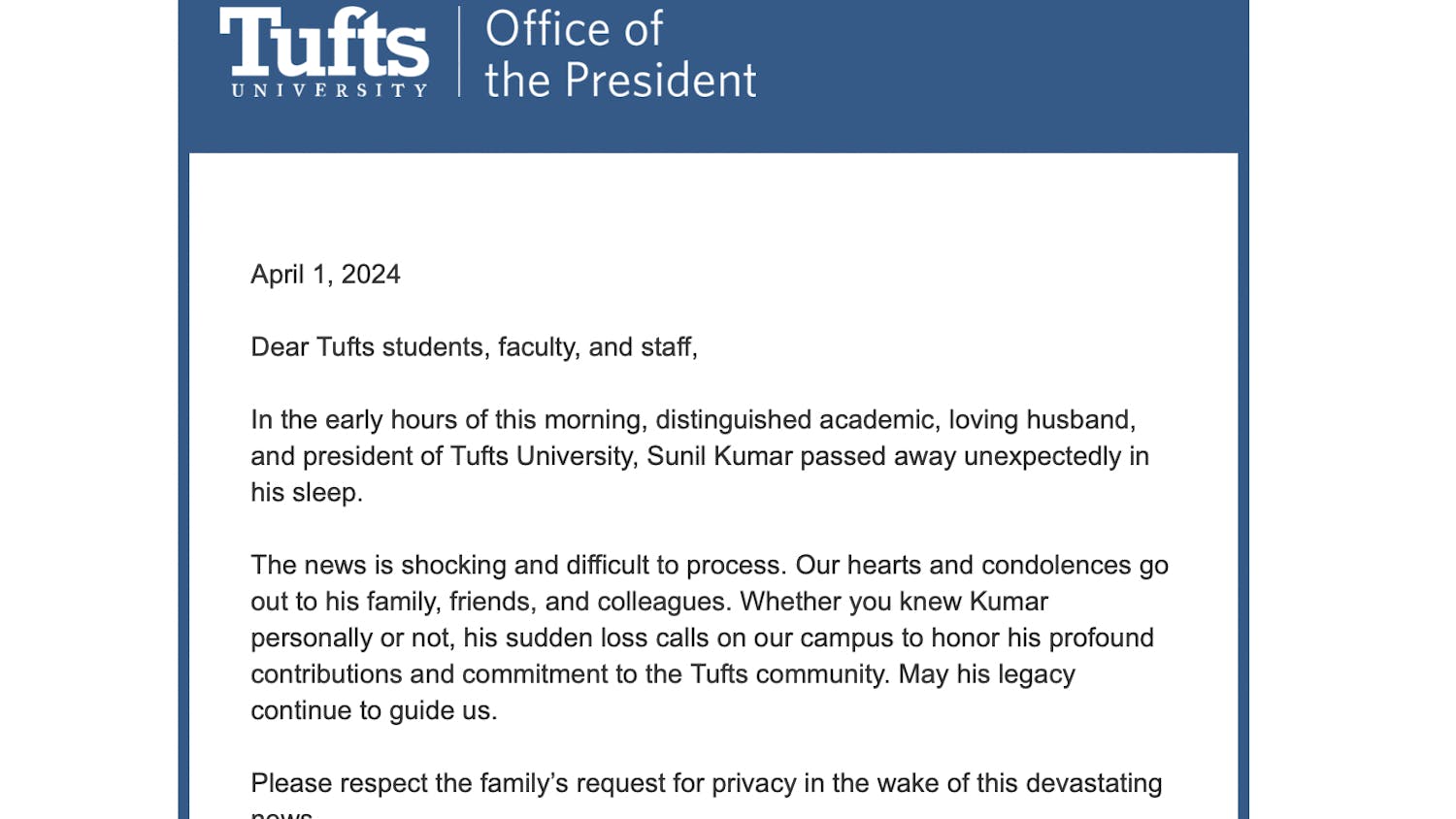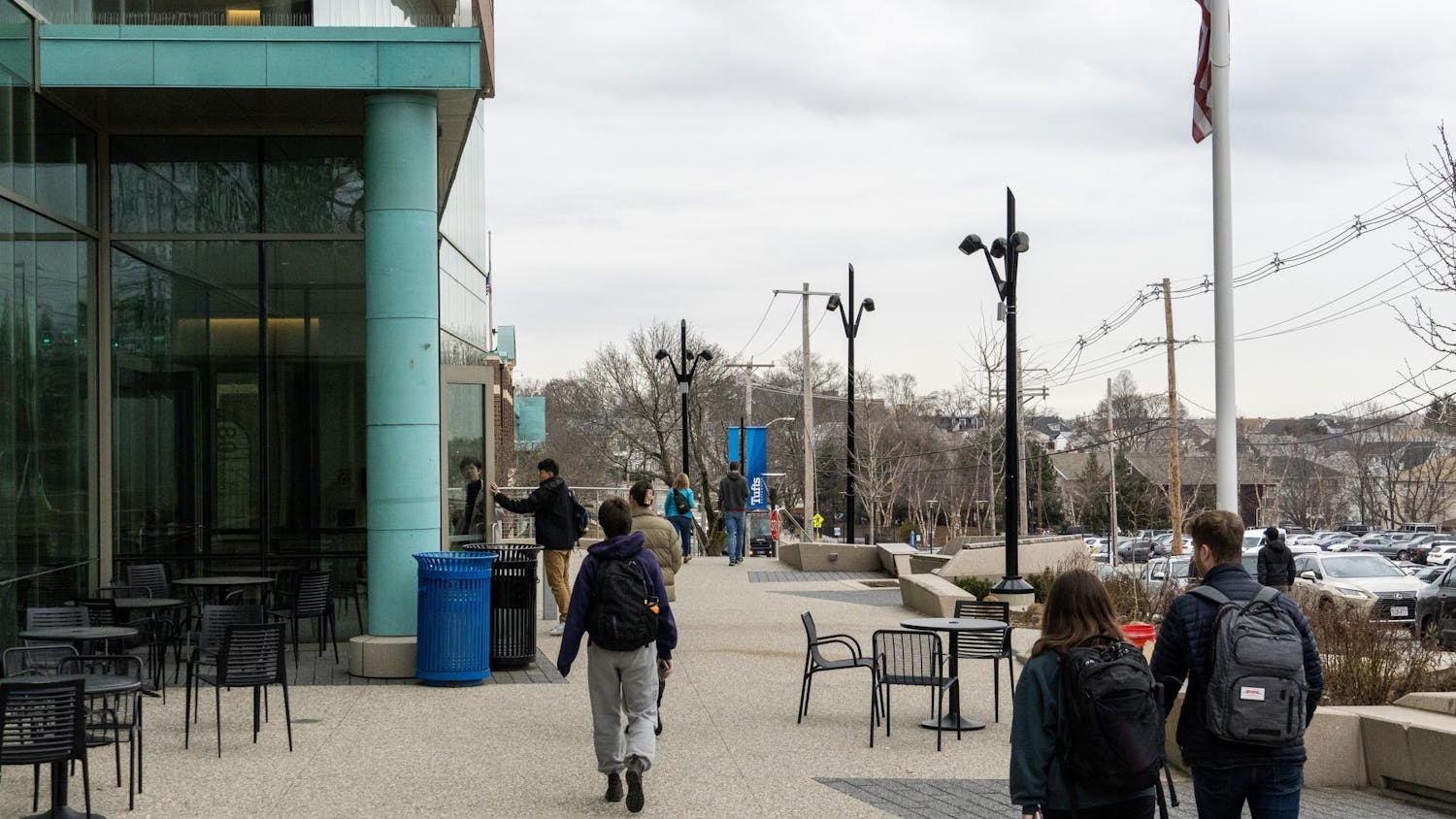A day before classes began this semester, junior Nina Collins received an email from her former boss. It was part-time lecturer Thomas MacIntyre, whom she had worked with in the fall.
MacIntyre teaches a photography course on the Medford/Somerville campus that operates under the School of the Museum of Fine Arts. The class is closed to SMFA students, reserved mostly for upperclassmen looking to put a slash through their distribution requirement for arts.
Collins had taken the class as a student and then worked for a semester as its “studio assistant” — the SMFA equivalent of a teaching assistant for an undergraduate course. She loved it: three hours a week, no office hours, a couple field trips to museums. A good gig.
She spent the winter break under the impression that she’d continue in her position in the spring, only to open her inbox on Jan. 18, a day before the start of classes, to discover that she wasn’t being rehired. At least not for pay.
The instructor told Collins that budgetary constraints had left the school unable to pay Collins as a studio assistant for the spring, despite having done so in the fall.
The news came as a shock to Collins but also to the instructor, who told Collins that he had found out about the situation that same day, according to emails between MacIntyre and Collins. MacIntyre did not return the Daily’s request for comment.
Collins’ story is reminiscent of others from students who work as course assistants in some humanities and fine arts classes. But for the most part, it contradicts the narrative conveyed to the Daily by students who work in STEM courses and some social science departments.
A months-long Tufts Daily investigation that included interviews with more than 50 faculty, administrators, and undergraduate and graduate students found that course assistants in some departments are vastly underpaid, including at least one below the university minimum wage.
Interviews also lifted the veil on what some students reported to be a pervasive culture of overwork and burnout among undergraduate course assistants in some departments. And in a number of cases, course assistants raised concern about what they deemed to be inadequate support from higher-ups.
This investigation recounts the stories of some of the 40 current and former undergraduate course assistants, spanning 15 departments and programs and all three undergraduate schools, who were interviewed by the Daily. “Course assistant” is a title the university uses to refer to undergraduates who assist instructors with tasks like grading, office hours and leading recitations. Undergraduates and faculty members often colloquially refer to them as teaching assistants.
Executive Director of Media Relations Patrick Collins did not directly comment on the extent to which university administrators oversee the wages of course assistants. In an email to the Daily, he wrote that course roles for undergraduates “are limited,” and that support for them may vary “based on the school or program in which the student is enrolled, the assignment provided, the discipline and available funding, among other factors.”
“Every school tries to provide opportunities to students that are academically engaging and provide support for the student’s academic program,” he wrote.
Enough for ‘a couple burritos from Picante’
Nina Collins’ wage was the lowest among the undergraduates who were interviewed for this article. The SMFA studio assistant was paid $12.50 per hour, a dollar below the university minimum at the time.
“Twelve-fifty is pretty stingy, especially for just working three hours,” Nina Collins said. Her duties consisted mostly of attending a three-hour class once per week, being there so she could assist the professor, answering questions from students and providing in-class feedback on photo assignments.
“Even 20 bucks an hour wouldn’t have been a dent,” Nina Collins said. “But it was fine, it really was just three hours out of my day, once a week.” She said her weekly salary, which she quantified as sufficient for “a couple burritos from Picante,” was fair overall.
The going rate for studio assistants has since been upped to $15, in alignment with the new university minimum that went into effect at the beginning of the year, according to interim SMFA dean Nate Harrison.
“If it’s $12.50, then we should definitely look into that because I believe it has been hiked to $15,” Harrison said. “But certainly I want to make sure that students get paid properly.”
The university-wide wage hike — which saw the minimum grow from $13.50 to $15 between fall 2021 and spring 2022 — matched a wage increase for federal contractors that went into effect at the end of January. The university’s minimum also exceeds the state-wide minimum of $14.25, which was put in place on Jan. 1 and represented an increase from $13.50 the year before.
Massachusetts is set to raise its rate to $15 per hour on Jan. 1.
Nina Collins was far from the only student interviewed to be affected by departmental budget constraints.
Avery, an undergraduate course assistant who spoke on the condition of anonymity for fear of professional repercussions, said they were limited to logging six hours per week for their job, even though their work usually spanned closer to 10 hours.
Avery, who worked as a learning assistant last fall, requested that the social sciences department they worked under not be named, fearing that doing so would expose their identity. Avery was paid a $1,800 stipend for the semester, earning $120 a week for 15 weeks. Department administrators framed the wage as equivalent to $20 an hour for a student working six hours per week.
But, for the learning assistants who worked closer to 10 hours per week, the $1,800 stipend translated to an hourly wage of $10 per hour — well below the university minimum at the time.
Avery also mentioned that the stipend salary they received had been slashed in half from what graduate teaching assistants had earned for the same course in the past. The course typically employed one teaching assistant, so when both Avery and their friend initially approached the professor about working for the course, they were told that they could do so on the condition that they each accept less pay than what the course’s single TA had received in the past, according to the anonymous student.
In larger departments and programs, students reported being hired with more ease and regularity.
The computer science department employs "an army" of roughly 200 TAs each semester, according to the department’s website, including “a few dozen” graduate students and more than 100 undergraduates. The introductory course, CS 11, employs around 40 undergraduates as course assistants, according to junior Jackson Parsells, who works for the course. CS 15, the second course most computer science students take, employed 39 undergraduate TAs in the spring. CS 160, an upper-level course, employed 20.
Chair of the Department of Computer Science Jeffrey Foster did not directly respond to a request for comment.
According to interviews, undergraduates in the department are paid $16 per hour for working as teaching assistants. Teaching fellows — undergraduates who oversee the teaching assistants for a given course while taking part in logistical and administrative duties like writing rubrics and creating exams — are paid $18 per hour.
The wage rates represent an increase from last semester, when CS teaching assistants were paid $14.50 and teaching fellows $16.50, according to interviews. The change kept the department’s TA wages consistently $1 above the minimum.
Students in some other departments, like psychology and economics, told the Daily that they receive semesterly stipends that translate to a rate that approaches — and in at least one estimate, exceeds — $40 per hour.
Ava Masse, an undergraduate course assistant for the Introduction to Cognitive and Brain Sciences course this spring, said she received a $5,000 stipend for the semester. Masse, who typically worked 10 hours per week, partnered with a couple other TAs to grade assignments and answer questions from the course’s 196 students.
Masse, a junior, said she enjoyed working for the course — her favorite part was getting to listen to the guest speakers who came and lectured to the class. But they said the scale of the work “can be quite a lot,” given the number of students enrolled.
Sam Sommers, the chair of the Department of Psychology, which houses the introductory course for which Masse was a TA, said that graduate students make up the majority of the department’s teaching assistants, with undergraduates filling spots in some cases based largely on availability.
Other departments that pay at least some of their undergraduates with a fixed stipend for the semester, as opposed to an hourly rate, include chemistry, economics, math, biology, community health, as well as the Department of International Literary and Cultural Studies, which houses many of the non-Romance language programs.
In at least once case, wage disparities existed among students working in the same position in a single department. Evelyn McClure said she made $3,000 this semester working three to four hours per week as a grader for the class Math of Social Choice. But McClure, a junior, said she would have made less than half that amount — $1,450 — working in the same position under a different professor in the fall, according to emails exchanged between McClure and members of the math department.
Senior Alycia Wong, who was a grader in the fall for the math class Differential Equations, said she worked approximately 10 hours per week and earned a $1,750 stipend for the semester — just over half the amount that McClure, who worked many fewer hours, earned while working for the same department this semester.
Stipends and wage rates varied widely among other departments, too. Junior Meghan Schroeder, who spent between six and seven hours each week as a course assistant for an introductory economics class in the fall, said she was paid a $4,000 stipend. Logan, a course assistant in the chemistry department who spoke on the condition of anonymity for fear of professional repercussions, earned a $2,200 stipend working roughly 10 hours each week.
Course assistants in some departments aren’t paid at all, instead receiving course credit for their work, according to Miranda Feinberg, a senior who was compensated with semester-hour units in the fall for her work as a teaching assistant for a film production course.
“It is a big time commitment, and I think that if I were to be in a position where I needed to get a job during the semester, it would not be possible while also doing this,” Feinberg said in an interview in October. “I think it’s a lot of work, where it does warrant some sort of payment.”
Film and media studies lecturer Natalie Minik, who taught one section of the course Feinberg worked for, told the Daily last fall that the TA position was “intended to give our advanced production students a chance to apply the skills and knowledge they have acquired during their time at Tufts in a teaching setting.”
“We are working as a program to standardize this experience for all our TAs who participate in this elective,” Minik said at the time.
Of the 40 course assistants interviewed for this article, Feinberg was the only one not offered pay for her job.
Wages and workload for other course assistants include:
Sophomore Emilia Marchelek, a Biology 14 learning assistant, reported earning an $895 stipend this semester working four to six hours per week.
Senior Samantha Keepax, a teaching assistant for the Organic Chemistry I lab, said she earned $300 per week working about 20 hours.
Junior Kaitlyn Szalay, a Biology 14 lab learning assistant, reported earning an $800 stipend working six to seven hours in the eight weeks she had lab this semester. Szalay said that the lab assistants she works with who are working in their jobs for a second semester earn $950.
Junior Kate Wujciak, a learning assistant for the mechanical engineering class Engineering Design, said she earned $15.50 per hour working between 4 ½ and 6 ½ hours per week.
Sophomore Anna Quiros, a course assistant for an EN 1 class in the electrical engineering department last fall, reported earning $15 per hour working about five hours per week.
Senior Sarah Gottesman, a course assistant for a Hebrew course, said she earned $50 per week working four-to-five hours this spring.
‘I do sometimes see a lot of people doing free work': In the computer science department, some students fear reporting all the hours they work
Many of the computer science students who were interviewed for this article spoke highly of the community among course assistants in the department.
“It’s probably my favorite thing that I do here at Tufts,” junior Lexi Blair, a teaching assistant for CS 15, said about her job. “The staff and everyone is awesome and it’s a good community to be a part of, and there’s a lot of really good things that go on.”
Several TAs also cited the department’s tightknit community as one of their primary motivations for being TAs. But for some, the supportive community and collaborative atmosphere in the computer science department has taken a toll on their life outside their job.
“Say you add an extra office hour shift, and other people haven’t canceled their office hours,” Jordan, a CS 160 TA who asked to remain anonymous for fear of losing their job, said. “If you’re just trying to be a nice human because students are struggling and they really, really need more support, and the infrastructure of the course and the department budgets do not allow that — that’s when you see a lot of TAs putting in hours they’re not paid for.”
Jordan recalls reading in an orientation document and hearing from other TAs that they should be careful not to work too many hours in order to prevent the department from exceeding its budget.
Including Jordan, three computer science teaching assistants independently told the Daily that they believed the department spent more than its budget in the fall. Junior Claudia Aranda Barrios, one of the teaching fellows, said that she believed the extent of the budget deficit was several thousand dollars. Diane Souvaine, the professor who teaches CS 160, was not able to provide comment. Foster did not directly respond to the Daily’s request for comment.
But senior Jake Little, who worked as a teaching fellow for CS 160 in the fall, which is before Jordan began their tenure in the position, said he remembers professors being very clear with TAs at the time in telling them that they should log and get paid for as many hours as they work. He said that after concerns about workload and compensation were raised by some TAs in a meeting last fall, he and the professor who was in the room at the time told the students that “if the department is going over budget for TAs, then that’s the department’s responsibility to figure out.”
Jordan alleged that a lack of transparency in the department has led them and other TAs to log fewer hours than they work.
“I personally don’t know how the system works, so I don’t know who I’m jeopardizing by logging extra hours,” they said. “It kind of feels like at times it’s just such an anonymous thing — that you don’t know who it’s trickling up to so you don’t want to try.”
Little also said that he had heard some TAs raising concern about a six-hour limit on logging hours per week, but he said at the time that he wasn’t sure where that idea came from.
In another sign of budgetary issues in the department, Jordan said that in the upcoming fall semester, CS 160 will be slashing its teaching fellow staff in half — from four to two. Jordan’s account was independently confirmed by another course assistant for CS 160.
Teaching fellows in the CS department, who sometimes work more than 20 hours a week, help administer the course and the TA staff while also holding office hours and picking up normal TA duties, according to interviews.
“To my knowledge, those people work insane hours, and I do not understand why a budget is such that two people should be slogging the whole semester,” Jordan said.
They added that they believe the alleged issues with compensation and overwork within the computer science department are concentrated mostly in the CS 160 course.
“But what I will say is that I do sometimes see a lot of people doing free work,” Jordan said.
Many TAs in other computer science courses expressed satisfaction with their compensation and workload. Jackson Parsells is a teaching fellow for CS 11. He said he loves the TA community. He loves working with students and the professor. And Parsells said he cherishes the opportunity to potentially “change someone’s path in life” by helping students who are new to computer science fall in love with the subject.
Parsells typically works 15 hours per week, but his hourly commitment has dipped to as low as 10 hours and surged to as high as 30 in a single week, usually near the exam period, he said. Parsells, who has worked as a TA or TF since fall 2020, said the weekly workload can also depend on which professor teaches the class and how much freedom the instructor lends to the teaching fellows.
Course assistants in other departments have also raised concerns about burnout and even imposter syndrome. Some said they felt undertrained when they first began their positions.
Alycia Wong, who has worked as a course assistant for three departments, including mathematics and chemistry, said she was “surprised by the lack of training for all my jobs beyond weekly virtual meetings.”
In an interview, Samantha Keepax, who worked as an Organic Chemistry I lab teaching assistant, expressed what many course assistants said in their interviews: She was surprised to find out that students in other departments were earning different wages than her.
“I have spoken to some of my friends that are TAs in other departments, and I would say that every time I tell them what my position entails, they’re always a little shocked,” Keepax said. “Because either their vetting process was much more grueling than mine, depending on the department,” or, she said, because “they’re paid significantly less than me for the hours they work.”
Aaron Gruen contributed reporting to this article.
Editor’s note: Jackson Parsells served on the Daily’s executive board as the web team lead. Evelyn McClure was on the Daily’s managing board as the business director. Neither was involved in the writing or editing of this article.






